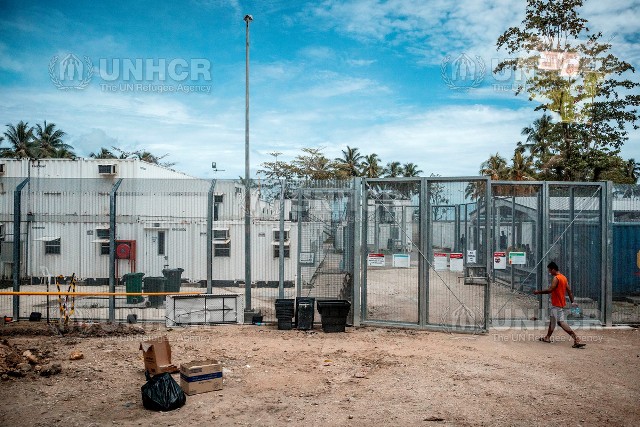 Regional Processing Centre on Manus Island, Papua New Guinea: The centres have been the focus of controversy with humanitarian and rights organisations. [Photographer: Vlad Sokhin/ credit: @UNHCR/Vlad Sokhin]
Regional Processing Centre on Manus Island, Papua New Guinea: The centres have been the focus of controversy with humanitarian and rights organisations. [Photographer: Vlad Sokhin/ credit: @UNHCR/Vlad Sokhin]
Abstract
Australian offshore processing of asylum seekers and others seeking to enter the country without authorisation has attracted substantive criticism for abuses of their human rights, particularly their mandatory detention in Australian-funded facilities located in Nauru and Papua New Guinea. Official and corporate disregard of the rights of Australians in dealing with those people – contrary to the official accountability that underlies the liberal democratic state – has attracted less attention. This article explores the offshore processing regime through an examination of how legislation that criminalises disclosure of information about mandatory detention is conceptually inconsistent with the freedom of political communication implied under Australia’s Constitution, and expected by Australian citizens. That legislation treats asylum seeking as a matter of national security rather than humanitarian law. It conflicts with the ethical obligations of health practitioners and others, and with Australian expectations about effective mandatory reporting intended to prevent abuse of children and other vulnerable people. It affects Australian and other officials, contractors, care providers, advocates, and journalists who deal with asylum seekers inside and outside Australia. Accountability and minimisation of harms to non-citizens can – and should – be achieved through an independent oversight mechanism reporting directly to parliament.
An Alternative Model
One response to the offshore regime is establishment of an alternative model of reporting that is consistent with international obligations and would assuage political concerns regarding national security whilst maintaining public confidence in the lawfulness of government action regarding asylum seekers. That model is based on the statutorily enshrined national Inspector-General of Intelligence Security (IGIS) and Independent National Security Legislation Monitor (INSLM), two positions that report to the national parliament on oversight of Australia’s national security agencies and legislation. In the current political climate it is unlikely that the government will resile from offshore processing and mandatory detention, particularly while the operation of that regime is cloaked in secrecy. In order to ensure accountability and effective critique through transparency we suggest establishment of a statutory position tasked with inspection of offshore and onshore detention facilities and with evaluation of the legislation.
The position would be independent of the Minister for Immigration & Border Protection, reporting instead directly to parliament (with those reports being publicly available). It would be adequately resourced, given the practice of Australian governments to hobble independent watchdogs by gross restrictions on their funding. The person occupying the position would hold office for a fixed period of years, removable from office only in instances of incapacity or misfeasance. The person would be authorised to inspect any facility in which ‘illegals’ are detained on behalf of the Australian government.
Creation of such a position would provide concerned ‘entrusted persons’ with a reporting mechanism capable of achieving outcomes, reflecting many of the benefits of the well-established whistle-blower protection schemes in place for many government employees who encounter unethical or unlawful practices in the course of their employment. Failure to do so will increase the likelihood that concerned officials, NGO representatives, contractors, and others will place public interest ahead of legality and accordingly resort to mechanisms such as Wikileaks.
Panopticist Jeremy Bentham warned that ‘In the darkness of secrecy, sinister interest and evil in every shape have full swing’, commenting
Where there is no publicity there is no justice. Publicity is the very soul of justice. It is the keenest spur to exertion and the surest of all guards against improbity.
The authors of this article consider that the Border Force secrecy provisions are inconsistent with both ethical and legal obligations regarding care for vulnerable people.



